YOU’D BE PSYCHO TO MISS THIS ONE
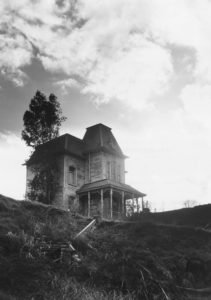 The golden age of movie scoring gave us soaring symphonic works by masters of the genre — Newman, Rosza, Tiomkin, Waxman — most of them inextricably married to the movies they describe. Yet of all of them, the scores that bear closer examination, and which give the greatest satisfaction with or without the accompanying pictures, are those by the great Bernard Herrmann.
The golden age of movie scoring gave us soaring symphonic works by masters of the genre — Newman, Rosza, Tiomkin, Waxman — most of them inextricably married to the movies they describe. Yet of all of them, the scores that bear closer examination, and which give the greatest satisfaction with or without the accompanying pictures, are those by the great Bernard Herrmann.
The Halloween treat offered at the gorgeous Theatre at the Ace Hotel last night was one of Hitchcock’s best known, and most popular of all his movies, Psycho, with Herrmann’s unforgettable score played live (the screenings — and the screamings — continue through All Hallow’s Eve, October 31). And what a treat it was to hear this edgy, nervous score for string ensemble played so immaculately by the LA Opera Orchestra under the assured baton of Louis Lohraseb. If you’ve not been to the theatre yet, you should: This delicately restored, 1,600-seat movie palace from the 1920s has a massive, three-story grand lobby, and was originated by Mary Pickford and Charlie Chaplin.
I wondered, as Janet Leigh hit the shower, how many in the packed audience were seeing the movie for the first time. It really doesn’t matter; whether you know what’s coming or not, the scene still shocks and disorients — the slithering, screeching violins raising the level of horror as the knife plunges over and over, then descending into the finality of the basses as the leading lady slides down the tiled wall into oblivion. It remains a measure of Hitchcock’s art that anyone seeing Psycho for the first time will think twice about stepping into a shower thereafter, and the visual shock is elevated immeasurably by Herrmann’s goosebump-raising scoring of the scene.
Born into a family of Russian immigrants, Herrmann studied at Juilliard, befriended Charles Ives, feuded with Leonard Bernstein, went on to score radio plays for Orson Welles, and burst into cinematic brilliance with his score for Welles’s Citizen Kane.
Herrmann’s philosophy of film music was not to write a “tune”, nor to “Mickey Mouse” action scenes, but to underline emotion and atmosphere, and to paint a psychological portrait of the characters and their conflicts. In this, he had no equal. In Citizen Kane, he gives us Kane’s inner torment from the deep, ominous bass of the opening credits through the cynically jaunty “declaration of principles”. In The Day The Earth Stood Still, we have the other-worldly tone of an alien visit, in Vertigo and Marnie, the sweeping, yet unconventional romanticism of elusive and perverse love.
He was an innovative composer, often orchestrating for unwieldy combinations of instruments to achieve atmosphere – the crashing grandeur of percussion and brass of his Harryhausen scores, his use of theremin in The Day the Earth Stood Still, copied and parodied relentlessly after his definitive use of it; or consider the extraordinarily undistinguished Beneath the 12 Mile Reef, elevated to endurability by Herrmann’s score which employed 9 harps; then the un-foot-tappable unease of the 7/4 passages of the “Fire Engine” cue from Farenheit 451. Consider also his rejected score for Hitchcock’s Torn Curtain — his orchestration for 9 trombones, 12 flutes, 16 horns and 2 tubas. Bowing to studio demands, Hitchcock rejected this score in favor of John Addison’s inertia-inspiring 3/4 dirge. This notably lesser of Hitchcock’s oeuvre might have gained a little more dignity (and Julie Andrews a little more sex appeal) had it been accompanied by Herrmann’s neurotic dissonances.
Certainly Herrmann’s major contribution to movies was afforded by his collaboration with Hitchcock. During this period, he provided definitive scores for seven of Hitchcock’s greatest films and some of the most fascinating symphonic music of the mid-20th century. Of all his extraordinary scores for Hitchcock, few are as effective as that for Psycho.
Melody is all but absent in this thriller but he frequently employs uncharacteristic (for Herrmann) leitmotif. The music is built around feelings, thoughts, atmospheres, reminding us more of fingernails scraping a blackboard than of the romance usually associated with strings. Even in the final moments of the movie, as Marion’s car is dragged from the swamp, there is no resolution of dissonance, no major chords signifying “the end”, merely the sonorousness of unresolved bass.
An exciting evening, in a glorious theater, watching one of the all time great Hitchcocks with its unforgettably defining score flawlessly played.
photos courtesy of LA Opera
Psycho
presented by LA Opera Off Grand
Theatre at the Ace Hotel, 933 S. Broadway in DTLA
ends on October 31, 2017 at 8pm
for tickets, call 213.972.8001 or visit LA Opera
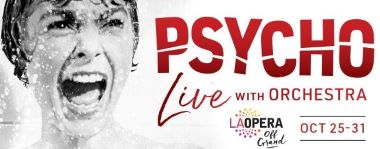
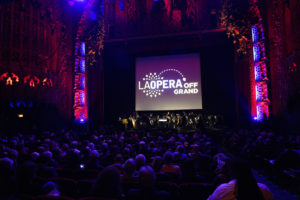
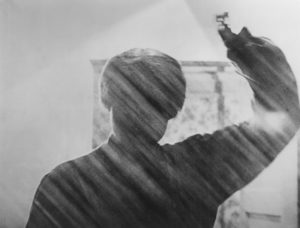
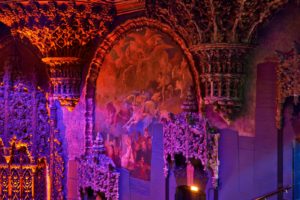
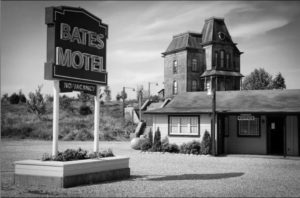
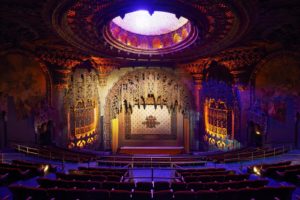

{ 1 comment… read it below or add one }
Your wonderful review has encouraged us to watch Psycho again after not watching since seeing when first released in Australia all those years ago. Will watch here, in Sydney, on the 31st — unfortunately without live orchestra.